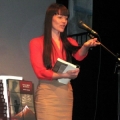You have no items in your cart. Want to get some nice things?
Go shopping John Lanchester’s Capital follows a group of Londoners all connected by the fact that they live on Pepys Road in one of the richest areas in London, and all receive a disturbing card proclaiming, We Want What You Have.
John Lanchester’s Capital follows a group of Londoners all connected by the fact that they live on Pepys Road in one of the richest areas in London, and all receive a disturbing card proclaiming, We Want What You Have.
The novel is an impressive feat, with a large and wide-ranging cast of characters: Roger the banker, Quentina the self-contained traffic warden, Petunia the dying widow, Matya the nanny, Bogden – real name Zbigniew – the builder, to name a few. The breadth of knowledge displayed of the goings-on behind the scenes of different industries, particularly banking, and the world of immigration law, is also impressive and compelling.
New characters emerge as we get more involved in these lives, like Mary, Petunia’s daughter who comes to look after her and watch her die. The range of emotions that Mary deals with is touching and true to life. Lanchester gets under the skin of a broad spectrum of people and relates their feelings.
One of the most interesting, inspiring and distressing characters is Quentina, the “most unpopular woman on Pepys road”. Initially billed as the Iron Lady of traffic wardens, we then glimpse her previous life as a campaigner for AIDS and human rights awareness in Zimbabwe, which got her beaten and left by a roadside with three days to “get out of the country”, escaping being “raped to death” purely because of her father’s previous standing. You get the sense that Lanchester has let Quentina off the hook here, which I was grateful for. And yet, the absence of what the author could have done here is incredibly loud. It reminds us of the glut of injustices in the world and, perhaps, does something to make us more aware of the realities of the lives of asylum seekers. When Quentina is discovered to be working illegally, she is sent to a detention centre and the catch-22 situation of a failed asylum-seeker caught in limbo, unable to be deported back to their own country due to risk of execution, is bleakly realised.
Contrast this story with that of Roger and his unbearable wife Arabella. When we meet Roger he’s stressing over a £1 million bonus. Reading this in a week when certain banks have been praised for demonstrating “restraint” in awarding seven-figure bonuses was fairly poignant. That women such as Arabella exist, uninterested in their children, childishly self involved and label-obsessed, is unquestionable. That they are static and unchanging I can also imagine. I did though think something more could have been done with this couple and with Arabella in particular. The novel suggests a hope for change or transformation with Roger. But the suggestion is tentative and could go either way.
The book pulls back the curtains on stereotypes, and hopes for change. But I was left feeling that something was missing: as thoughtful a consideration of the women characters as there was of the men. I found it depressing that Roger, who I liked because he was uncomfortable with his boss’s chauvinistic attitudes to women, ended up perving over the hot nanny, Matya. Again, perhaps a reality for some, but there wasn’t much space afforded to non-superficial qualities.
Perhaps Lanchester intends a comment on what is wrong with the capital: how we view people as commodities, and on the saturation of the superficial. Keeping up appearances is paramount, yet is this also what has crippled society. But I wanted to know more about Matya, about Arabella even. If Roger had fallen for Matya because of who she was, not her exoticism or hotness, that might have seemed hopeful.
There are some outrageous, laugh-out-loud and sensitive moments, for example the section where Roger has to look after the children himself for two days. When his little boy majestically craps all over him I chuckled for a long time. There are many such moments that strike an emotional or comic chord.
But at times, I felt there were too many characters and that the narrative momentum stalled as we investigated yet another person and their background. I felt the intrigue behind who had instigated the We Want What You Have campaign became a loose and almost unnecessary way of connecting these characters. I expected that mystery to play a larger role, or to feel more threatening.
Although the moments of comedy and sensitivity made this a rewarding read, I was left wanting a stronger sense of narrative urgency.

Sarah Dobbs
Sarah Dobbs is a lecturer in English and Creative Writing. Her novel, Killing Daniel, was published by Unthank Books in 2012. Previous work has been broadcast by the BBC, published by Flax, SWAMP and Step Away Magazine. She is currently editing a textbook for English and Creative Writing students.





This is my review of Capital by John Lanchester on @LitroMagazine http://t.co/5ODnYByenE
@sarahjanedobbs reviews ‘Capital’ by John Lanchester at Litro Magazine – http://t.co/B0BP1Vmjlt #wewantwhatyouhave #litroreads